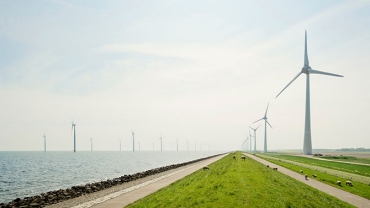
Subtle nudges increase willingness to pay for a 'fair' product
05/04/23
Experiment to solve green consumer paradox
Small nudges are capable of raising consumer willingness to pay for sustainable products. That's the outcome of an experiment PwC conducted internally.
The research focused on the additional price consumers would be willing to pay for a ‘fair’ T-shirt: recyclable and sustainably produced under acceptable working conditions. The experiment and results are captured in our publication Embracing the fair price of a T-shirt.
Helping consumers embrace a fair price
Studies of willingness to pay for sustainable products are numerous. So are studies of the ‘real’ or ‘fair’ price of sustainable products. 'This study goes a step further and examines the extent to which consumers can be encouraged to embrace the fair price and pay it when shopping', explains PwC Chief Economist Jan Willem Velthuijsen.
Societal costs are not incorporated into the prices of many products
For many goods, including clothing, the price is determined by aspects like raw materials, production, labor, transportation, storage and marketing. The social costs such as the costs of pollution, are not included in the price. When producers address these so-called negative externalities by switching to more sustainable production or by improving working conditions, their products become more expensive.
The green consumer paradox
Velthuijsen: ‘Consumers increasingly express a preference for sustainable production, but the willingness to pay for it lags behind. We call this the green consumer paradox. This is a real and urgent problem for a wide range of products that requires a solution. That's why we asked ourselves how we could contribute to a solution using modern insights from economics.'

Multidisciplinary approach to approximate reality
In the experiment we combined tools from three areas of knowledge. First experience design technology to simulate a shopping environment (a web shop in this case). From psychology, various ‘nudges’ were added for different groups of participants, small interventions that (often unconsciously) move consumers in a certain direction.
In addition, we chose not to ask participants in the experiment directly about their preferences but to let them make trade-offs between aspects such as the price, production methods and country of origin of the various (fictitious) T-shirts. Velthuijsen: By combining different instruments, we mimicked reality as much as possible when making purchasing decisions.’
Psychology plays a role in sustainable decisions
The experiment showed that randomly elected, ‘nudged’ participants were willing to pay more for a T-shirt compared to a control group who were shown a completely neutral version. Velthuijsen: And yes, we only conducted this experiment within our own company and did not apply it to a broader group of consumers. And we only had the participants make trade-offs about a t-shirt, not about other products. But the experiment indicates that, beyond the price tag, psychology plays an important role in making sustainable decisions. It shows that subtle, tailored nudges can put consumers on the path to a more sustainable choice, even if there is a considerable price difference.
The solution to green consumer paradox is not only in stricter rules
Of course more needs to be done, emphasizes Jan Willem Velthuijsen. 'More transparency in the supply chains, as new European rules will enforce, is also needed to enable consumers to make better, more sustainable, decisions. It is good that companies have to substantiate green claims better and better. But what our experiment shows is that solving the green consumer paradox does not only depend on stricter regulation in all kinds of areas. It also allows providers of sustainable products to continue experimenting in a similar way.'


















